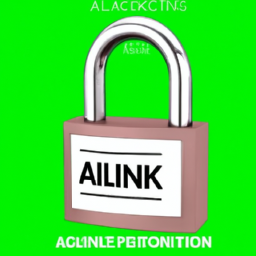
In this article, you will learn strategies to protect your affiliate links and prevent commission theft. We all work hard to earn those commissions, so it’s important to make sure they are not being stolen by others.
One way to prevent commission theft is by using URL redirecting. This involves redirecting your affiliate links to another link that is not easily traceable. It adds an extra layer of security, making it harder for dishonest individuals to replace your affiliate ID with their own. Another strategy is to use link cloaking. This hides your affiliate link behind a different URL, making it less obvious and less likely to be tampered with. By implementing these strategies, you can safeguard your affiliate links and ensure that you receive the commissions you rightfully deserve.
Understanding Affiliate Link Theft
Affiliate link theft is a growing concern for many online marketers and influencers. As an affiliate marketer, you rely on commission earnings from affiliate programs. However, there are individuals and organizations that seek to exploit your hard work by stealing your affiliate links, redirecting your commissions to their own accounts. Understanding the impact of affiliate link theft and the common methods used can help you prevent and protect your earnings.
What is affiliate link theft?
Affiliate link theft refers to the unauthorized redirection of affiliate commission earnings from an affiliate marketer to another party’s account. It occurs when someone manipulates or replaces your affiliate link with their own, taking credit for the referral and subsequently stealing your commission. This is particularly detrimental for affiliate marketers who heavily rely on the income generated through commissions.
The impact of affiliate link theft on your earnings
Affiliate link theft can have a significant impact on your earnings. When your affiliate links are hijacked, the commissions that you worked hard to earn are redirected to someone else’s account. This means that your efforts in driving traffic and generating sales go unrewarded, undermining your motivation and potentially affecting your financial stability. Additionally, if left unchecked, affiliate link theft can damage your reputation and credibility in the industry.
Common methods used in affiliate link theft
There are several common methods that perpetrators use to steal affiliate links. By understanding these methods, you can better protect yourself against potential theft:
- Cookie Stuffing: This method involves forcefully planting affiliate cookies on a user’s device without their knowledge or consent. By doing so, the perpetrator can ensure that their affiliate ID is credited for any future purchases made by the user.
- Link Hacking: In this method, the thief directly hacks into your website or affiliate account and replaces your affiliate links with their own. This is particularly devastating as it can go undetected for a long time, allowing the thief to collect commissions without you realizing it.
- Adware and Browser Extensions: Some malicious adware or browser extensions can secretly modify the affiliate links on a website, redirecting the commissions to the perpetrator’s account.
Identifying Signs of Affiliate Link Theft
Recognizing the signs of affiliate link theft is crucial in order to take appropriate action to protect yourself. Here are a few indicators that may suggest your affiliate links are being stolen:
Sudden drop in affiliate commissions
If you notice a significant decrease in your affiliate commissions without a clear reason, it could be a sign of affiliate link theft. Monitor your earnings closely and investigate any sudden drops to identify potential theft.
Unusual referral patterns
Keep an eye on your referral patterns and traffic sources. If you notice a sudden influx of referrals from suspicious sources or websites, it may indicate that your affiliate links are being manipulated or redirected without your knowledge.
Multiple affiliate IDs appearing for the same transaction
Check the purchase records and transaction logs provided by the affiliate program. If you find multiple affiliate IDs associated with the same transaction, it is a strong indication of affiliate link theft. This suggests that someone else is claiming credit for the same referral, potentially stealing your commissions.
Preventive Measures for Affiliate Link Theft
Taking proactive steps to prevent affiliate link theft is essential for safeguarding your earnings. Here are some effective preventive measures you can implement:
Implement URL shortening and cloaking techniques
Using URL shortening and cloaking techniques can help protect your affiliate links. By shortening and disguising your links, you can make them less vulnerable to theft and manipulation. Additionally, you can hide the actual destination from potential thieves, making it more difficult for them to replace your affiliate link with their own.
Use link tracking and analytics tools
Implementing link tracking and analytics tools can provide you with valuable insights into the performance of your affiliate links. These tools can help you detect any abnormalities or suspicious activities, allowing you to take immediate action to prevent affiliate link theft.
Regularly monitor your affiliate accounts and earnings
Stay vigilant and regularly monitor your affiliate accounts and earnings. By regularly reviewing your performance and earnings, you can quickly identify any suspicious activities or discrepancies. Prompt action is crucial in minimizing the impact of affiliate link theft.
Protecting Affiliate Links with Website Security
Website security plays a vital role in protecting your affiliate links from theft. Implementing the following measures can enhance the security of your website:
Use secure website hosting and SSL encryption
Choose a reliable and secure website hosting provider that prioritizes website security. Additionally, ensure that your website has SSL encryption enabled. This not only protects your visitors’ data but also strengthens the security of your affiliate links.
Implement CAPTCHA or other anti-bot measures
CAPTCHA and other anti-bot measures can help prevent automated bots from tampering with your affiliate links. These security measures add an additional layer of protection by verifying the authenticity of the user and reducing the chances of link manipulation.
Regularly update and patch your website’s security plugins
Keep your website’s security plugins and software up to date. Regularly applying updates and patches ensures that your website remains protected against potential vulnerabilities that could be exploited by link thieves.
Building Trust with Your Audience
Building trust with your audience is not only beneficial for your overall affiliate marketing strategy but also acts as a deterrent against affiliate link theft. Consider the following strategies:
Focus on high-quality content and valuable recommendations
Producing high-quality content that delivers value to your audience is crucial. By offering genuine recommendations and honest reviews, you can establish trust with your audience. This trust can discourage potential thieves from attempting to manipulate your affiliate links.
Establish yourself as an authority in your niche
Positioning yourself as an authority in your niche helps authenticate your recommendations and affiliate links. Consistently sharing valuable insights, demonstrating expertise, and establishing a reputation as a trustworthy source can go a long way in protecting your affiliate links.
Encourage user reviews and testimonials
Encouraging user reviews and testimonials adds social proof to your affiliate recommendations. Genuine reviews from satisfied customers can act as a powerful deterrent against affiliate link theft, as potential thieves may be discouraged by the risk of negative exposure.
Building Relationships with Trusted Affiliates
Collaborating with trusted affiliates not only strengthens your network but also adds an extra layer of protection against affiliate link theft. Consider the following practices when partnering with affiliates:
Perform due diligence before partnering with affiliates
Before entering into an affiliate partnership, conduct thorough background checks on potential affiliates. Verify their credibility, reputation, and adherence to ethical practices. Partnering with trustworthy affiliates reduces the risk of link theft and ensures a more secure working relationship.
Maintain open communication and transparent reporting
Establish clear lines of communication with your affiliate partners and maintain transparent reporting practices. Regularly share insights, updates, and performance metrics to keep each other informed. This transparency not only fosters a stronger working relationship but also allows for mutual protection against link theft.
Avoid partnering with affiliates involved in unethical practices
Stay away from affiliates engaged in unethical practices or those with a history of link theft. Associating with such affiliates can not only jeopardize your commission earnings but also harm your reputation. Conducting due diligence before partnering is crucial in maintaining the integrity of your affiliate marketing efforts.
Legal Protection against Affiliate Link Theft
Understanding and enforcing the terms of service of your affiliate programs is essential in protecting your affiliate links. Here are some legal measures you can take:
Understand and enforce affiliate program terms of service
Familiarize yourself with the terms of service of the affiliate programs you participate in. Ensure that you follow the guidelines provided by the affiliate networks or merchants and promptly report any instances of suspected affiliate link theft. By adhering to the terms of service, you increase the likelihood of receiving assistance from the program in resolving any issues.
Consult with legal professionals to draft secure agreements
Seek legal advice to draft secure agreements with your affiliate partners. These agreements can provide additional protection against affiliate link theft and establish clear guidelines for both parties to follow. Consulting with legal professionals ensures that your agreements are legally sound and enforceable.
Take legal action against perpetrators if necessary
In extreme cases, where affiliate link theft persists despite preventative measures, consider taking legal action against the perpetrators. Consult with legal professionals who specialize in intellectual property and online fraud to determine the best course of action. Legal action may help in reclaiming stolen commissions and preventing further theft.
Educating Yourself about Affiliate Link Theft
Staying informed about the latest affiliate marketing trends and practices is crucial in protecting your affiliate links. Consider these strategies to enhance your knowledge:
Stay updated on the latest affiliate marketing trends and practices
Continuously educate yourself about the latest trends and practices in affiliate marketing. Stay updated on the evolving methods used by link thieves and potential countermeasures available. Subscribe to reputable blogs, newsletters, and industry publications to stay informed.
Join forums and communities to learn from experienced affiliates
Engage in forums and communities dedicated to affiliate marketing. Interacting with experienced affiliates can provide valuable insights and practical strategies in preventing and dealing with affiliate link theft. Share experiences, learn from others, and stay connected with the affiliate marketing community.
Attend webinars and workshops on affiliate link protection
Participating in webinars and workshops focused on affiliate link protection can provide in-depth knowledge on safeguarding your earnings. These educational events often feature industry experts who share their expertise and best practices in affiliate marketing security.
Strategies for Reclaiming Stolen Commissions
In the unfortunate event that your affiliate links are stolen and commissions are redirected, you can take certain steps to reclaim your earnings:
Contact the affiliate network or merchant for assistance
Reach out to the affiliate network or merchant whose program you are promoting. Inform them about the affiliate link theft and provide them with evidence, such as analytics data or transaction records. They may be able to provide assistance in recovering your stolen commissions.
Provide evidence and document instances of theft
Document all instances of affiliate link theft, including dates, evidence, and any communication you have had regarding the theft. This evidence will be crucial in supporting your case when reporting the theft or seeking legal action.
Consider alternative affiliate programs or networks
If the affiliate program you are currently promoting is unable to assist you in reclaiming your stolen commissions, consider exploring alternative programs or networks. Research reputable programs with robust security measures and a track record of effectively dealing with affiliate link theft.
Conclusion
Protecting your affiliate links from theft is essential in preserving your hard-earned commissions and ensuring the sustainability of your affiliate marketing efforts. By implementing proactive measures, such as URL shortening techniques, website security measures, and maintaining a strong network of trusted affiliates, you can significantly reduce the risk of affiliate link theft. Stay informed, build trust with your audience, and take legal action if necessary. By being proactive, attentive, and adaptable to evolving methods of commission theft, you can safeguard your earnings and maximize your profits in the competitive world of affiliate marketing.





